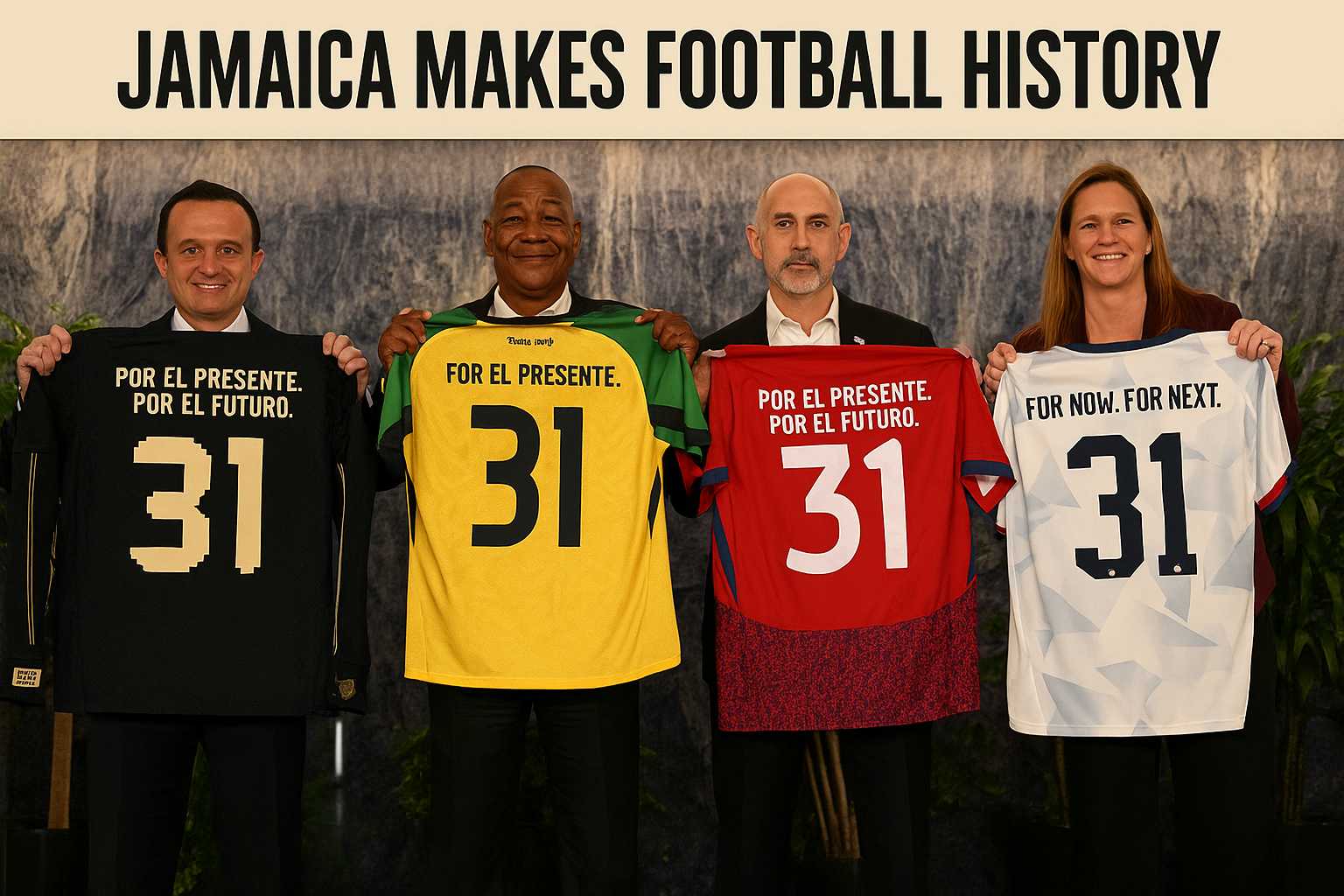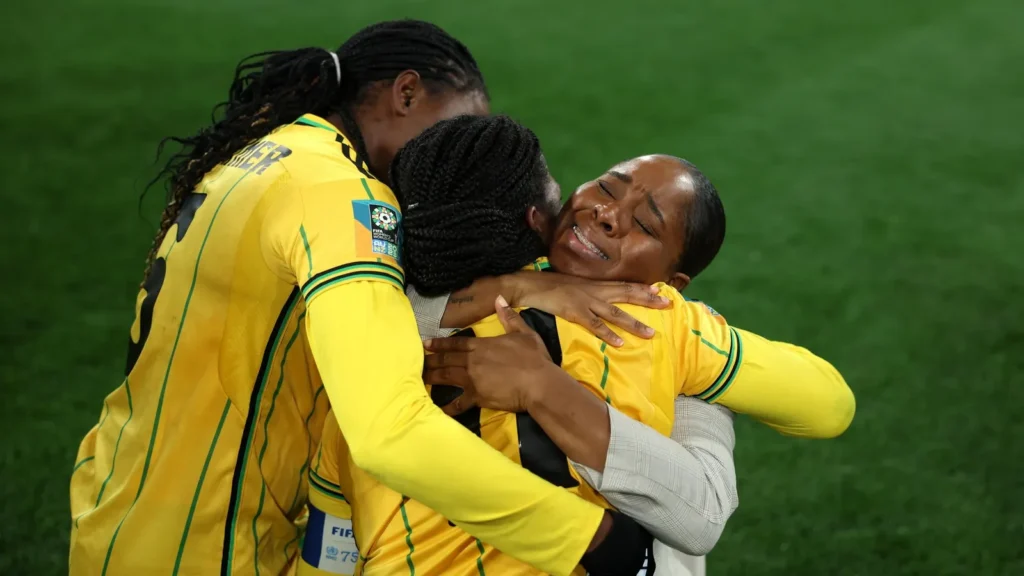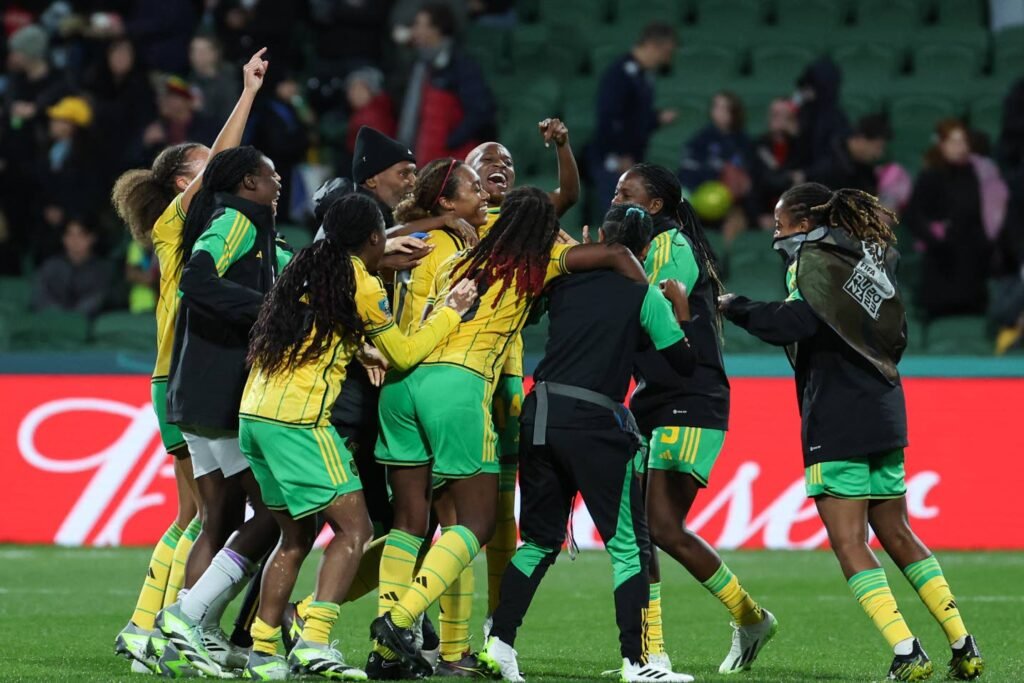
When the yellow, green, and black jersey appeared alongside its red and white counterparts in New York, something powerful happened. Jamaica, a small island with a mighty sporting soul, officially stepped into history. For the first time ever, a Caribbean nation is set to host matches in a FIFA World Cup tournament.
This milestone—part of a joint bid led by the United States with Mexico, Costa Rica, and Jamaica for the 2031 Women’s World Cup—is far more than a sporting event. It’s a cultural awakening, a regional triumph, and a powerful symbol of how far the island has come since those humble early days of football played on dusty parish fields.
The Spirit Behind the Jerseys
At the announcement ceremony, leaders from the four federations held jerseys emblazoned with “31”—a nod to the year 2031 and a vision of shared progress. On Jamaica’s green and gold shirt read the words “For Now. For Next.” It was more than a slogan. It was a declaration of intent: that this moment is not just for celebration, but for building the next generation of Jamaican athletes, entrepreneurs, and dreamers.
Behind that smile stood the weight of history. For decades, Jamaica has sent waves of talent to the world—from track and field legends to football heroes. But hosting a World Cup match? That was once unimaginable. Now, it’s within grasp.
More Than Just a Game

If Jamaica’s inclusion is confirmed in FIFA’s April 2026 decision, it won’t just be a victory for football—it’ll be a victory for Caribbean pride. The island would join global powerhouses in staging one of the world’s most prestigious tournaments, but the story runs deeper than stadium lights and ticket sales.
For the Reggae Girlz, who made history as the first Caribbean team to reach the Women’s World Cup knockout stage, this is poetic justice. Hosting games at home gives young girls in Jamaica a front-row seat to their heroes. It says: You don’t have to leave to be great. That’s a message worth more than gold.
What It Means for Jamaica
Hosting part of the Women’s World Cup could ignite a transformation beyond sport. Stadium upgrades, improved transport routes, tourism expansion, and global media coverage would inject life into local economies. But more importantly, it could rekindle a sense of national pride at a scale unseen since Usain Bolt’s Olympic lightning strikes.
Imagine Kingston alive with music and flags, Spanish Town vendors serving patties to visitors from every corner of the world, and reggae beats echoing through fan zones. It would be a festival of culture wrapped in football—a uniquely Jamaican experience that no other host could replicate.
For small businesses, the opportunities would be endless: local artisans creating memorabilia, guesthouses hosting international fans, restaurants showcasing Jamaica’s culinary brilliance, and tour operators offering experiences that go beyond beaches—introducing visitors to the island’s heritage, spirit, and heart.
The Road Ahead
Hosting a World Cup doesn’t happen overnight. There will be challenges—upgrading venues to meet FIFA standards, enhancing security and transportation systems, and ensuring the infrastructure can handle global crowds. But Jamaicans know a thing or two about rising to challenges. From Marcus Garvey’s call for self-determination to Shelly-Ann Fraser-Pryce’s sprinting supremacy, Jamaica has never been afraid of the big stage.
The world will be watching, and Jamaica’s moment to shine will depend on preparation, unity, and vision. The partnerships formed now—between government, private sector, and community—will decide how bright that moment becomes.
The Legacy of 2031

If approved, the 2031 Women’s World Cup will mark a new era for football and the Caribbean as a whole. The tournament’s legacy could be transformative: more women in sport, better facilities for youth development, and an enduring reminder that greatness isn’t limited by geography.
This is Jamaica’s chance to prove, once again, that its influence extends far beyond its size. The same island that gave the world reggae, Rastafari, and sprinting royalty is now poised to redefine the Caribbean’s role in global football.
When the whistle blows in 2031, the stands will shake with the rhythm of drums and the roar of island pride. And somewhere in the crowd, a little girl in a green jersey will look out at the field and whisper, “One day, that will be me.”
That’s the power of this moment.
That’s the magic of Jamaica.
